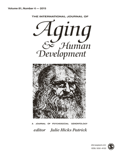
INTERNATIONAL JOURNAL OF AGING & HUMAN DEVELOPMENT
Scope & Guideline
Bridging Disciplines in Aging and Human Growth
Introduction
Aims and Scopes
- Gerontological Research:
The journal publishes studies that explore the biological, psychological, and social aspects of aging, providing insights into the aging process and its impact on health and well-being. - Diversity and Inclusion in Aging:
Research addressing disparities among different demographic groups, including racial, ethnic, and sexual minorities, is a core focus, highlighting the unique challenges faced by these populations as they age. - Mental Health and Well-Being:
Papers often explore the mental health issues associated with aging, including depression, anxiety, and social support, emphasizing the importance of psychological resilience and emotional well-being in older adults. - Caregiving Dynamics:
The journal features research on family caregiving, including the experiences of caregivers, the impact of caregiving on mental health, and the relationship quality between caregivers and care recipients. - Health Disparities and Aging Policy:
Contributions often examine health inequalities among older adults and advocate for policy changes to improve health outcomes and access to services for aging populations. - Social Participation and Community Engagement:
The importance of social networks, participation in community activities, and their effects on the quality of life for older adults is a recurring theme, underscoring the role of social capital.
Trending and Emerging
- Impact of Social Support on Aging:
Recent studies increasingly highlight the role of social support systems in enhancing mental health and quality of life among older adults, recognizing the importance of community and relationships. - Intersectionality in Aging Research:
There is a growing emphasis on intersectional approaches that consider how various identities (race, gender, socioeconomic status) interact to affect the aging experience, leading to more inclusive research. - Mental Health and Resilience:
Research focusing on mental health, resilience, and coping strategies in older adults is on the rise, particularly in the context of stressors such as the COVID-19 pandemic. - Technology and Aging:
Emerging themes include the role of technology in promoting well-being and social connection among older adults, particularly regarding telehealth and digital engagement. - Cultural Perspectives on Aging:
There is an increasing exploration of cultural attitudes toward aging and the impact of cultural practices on the aging experience, reflecting a more global perspective in gerontological research. - Environmental and Community Factors:
Studies examining the influence of community design and environmental factors on the well-being of older adults are gaining traction, highlighting the significance of age-friendly environments.
Declining or Waning
- Focus on Traditional Aging Models:
There appears to be a waning interest in traditional aging models that emphasize biological aging alone, as contemporary research increasingly incorporates psychological and social dimensions. - Generalized Aging Stereotypes:
Research specifically addressing aging stereotypes without a contextual or intersectional lens has diminished, as the field moves towards more nuanced discussions that incorporate cultural and individual differences. - Cognitive Aging Studies:
While cognitive aging remains important, studies that solely focus on cognitive decline without considering the roles of social factors and emotional well-being are becoming less frequent. - Single-Dimensional Health Interventions:
There is a noticeable decline in studies that evaluate health interventions in isolation from social contexts, as the journal increasingly emphasizes comprehensive, multifactorial approaches to health in aging. - Age-Related Economic Studies:
Research focusing on the economic aspects of aging, such as retirement planning or financial literacy, has decreased, with a shift towards a broader understanding of well-being and quality of life.
Similar Journals
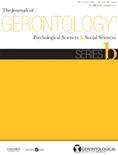
JOURNALS OF GERONTOLOGY SERIES B-PSYCHOLOGICAL SCIENCES AND SOCIAL SCIENCES
Pioneering Studies in Aging and Social RelationsJOURNALS OF GERONTOLOGY SERIES B: PSYCHOLOGICAL SCIENCES AND SOCIAL SCIENCES, published by Oxford University Press Inc, stands as a premier scholarly outlet dedicated to the interdisciplinary study of aging, psychological sciences, and social relations. With a notable E-ISSN of 1758-5368 and a track record from 1995 to 2024, this journal has firmly established itself within the top quartile (Q1) across multiple domains including Clinical Psychology, Geriatrics, Gerontology, and Social Psychology. Its rigorous standards propel significant research that contributes to understanding the complexities of aging in contemporary society. Researchers and professionals engaged in these fields benefit from its high-impact publications, underscored by impressive rankings—such as 6th in Geriatrics and Gerontology—positioning it amongst the leading journals globally. While there are currently no Open Access options available, the journal remains a vital resource for advancing knowledge on life-span and life-course studies, ensuring that critical insights reach its dedicated audience of scholars and practitioners.
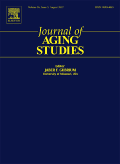
JOURNAL OF AGING STUDIES
Innovating Insights into Aging StudiesJOURNAL OF AGING STUDIES is a leading publication dedicated to the interdisciplinary exploration of aging, providing a platform for researchers, professionals, and students interested in the complex dynamics of aging in contemporary society. Published by Elsevier Science Inc, this esteemed journal has established itself as a key resource in various categories, achieving a Q1 ranking in Issues, Ethics and Legal Aspects and a Q2 ranking in multiple health-related disciplines as of 2023. The journal focuses on a broad range of topics, including health policy, social sciences, and life-span studies, contributing significantly to discussions surrounding aging through its rigorous peer-reviewed articles and comprehensive research studies since its inception in 1987. With an ISSN of 0890-4065 and an E-ISSN of 1879-193X, it serves as an essential reference for academic and professional audiences, and remains committed to advancing knowledge and policy in the field of aging.
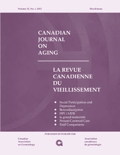
CANADIAN JOURNAL ON AGING-REVUE CANADIENNE DU VIEILLISSEMENT
Innovating insights into the demographics of aging.Canadian Journal on Aging - Revue Canadienne du Vieillissement is a leading journal published by Cambridge University Press, dedicated to advancing the empirical understanding of aging and its multifaceted impacts on individuals and society. As a vital resource in its field since 1982 and continuing through 2024, this journal fosters discourse among researchers, practitioners, and policymakers with a keen interest in the demographics, health, and societal aspects of aging. It holds a distinguished position in the academic landscape, earning a Q1 ranking in Community and Home Care and Q2 rankings in Geriatrics & Gerontology, Gerontology, and Health (Social Science) as of 2023. Articles are rigorously peer-reviewed to uphold the highest academic standards, ensuring impactful contributions to aging studies. While the journal does not currently offer open access, it serves as an essential platform for sharing innovative research findings that shape the future of elder care and gerontological practice. With a focus on both Canadian contexts and broader international perspectives, the Canadian Journal on Aging provides critical insights that empower professionals and inspire future generations of scholars.
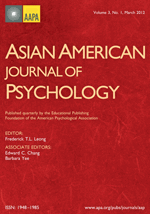
Asian American Journal of Psychology
Championing diverse perspectives in psychology.The Asian American Journal of Psychology is a premier academic publication dedicated to advancing the field of psychology by focusing on the experiences, mental health needs, and unique cultural contexts of Asian American populations. Published by the Educational Publishing Foundation of the American Psychological Association, this journal has established itself as a critical platform since its inception in 2010, promoting high-quality empirical research and scholarship. With an impact factor placing it in the second quartile (Q2) for 2023 in the miscellaneous psychology category, it ranks #98 out of 216 in general psychology according to Scopus, reflecting its significant contribution to the discipline. Although it does not operate under open access, the journal's robust editorial standards ensure that the research published is both credible and relevant. Aimed at researchers, professionals, and students alike, the Asian American Journal of Psychology seeks to foster a deeper understanding of psychological issues affecting the Asian American community and serves as an essential resource for those committed to diversity and inclusion in psychological research.

Journal of Population Ageing
Connecting Research with the Challenges of AgeingThe Journal of Population Ageing, published by SPRINGER INT PUBL AG, stands as a prominent platform for the exploration and dissemination of research within the fields of demography, geography, and sociology. With an ISSN of 1874-7884 and an E-ISSN of 1874-7876, this journal navigates the complexities of population ageing, a vital topic as societies worldwide confront the implications of an ageing demographic. The journal boasts impressive Scopus rankings, including the 30th rank in Demography and a 78th percentile in Sociology and Political Science, emphasizing its significant role in academic discourse. It is highly regarded in its Q2 category quartiles for Demography, Geography, Planning and Development, and Sociology and Political Science, showcasing its relevance and scholarly impact. Although not an open-access publication, the journal's carefully curated articles aim to inform and advance knowledge, making it an invaluable resource for researchers, professionals, and students invested in understanding the multifaceted challenges associated with an ageing population. With its comprehensive scope and commitment to quality, the Journal of Population Ageing continues to contribute meaningfully to the evolving conversation on demographic trends and their societal implications.
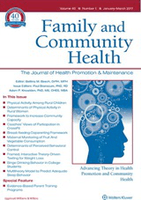
FAMILY & COMMUNITY HEALTH
Advancing the Dialogue on Family and Community Well-BeingFAMILY & COMMUNITY HEALTH, published by Lippincott Williams & Wilkins, is a prestigious journal that has been at the forefront of public health research since its inception in 1978. With its ISSN (0160-6379) and E-ISSN (1550-5057), the journal serves as a vital resource for professionals, researchers, and students dedicated to understanding the intricate dynamics between family and community health. Its significant impact is illustrated by its placement in the Q2 category within Public Health, Environmental and Occupational Health, highlighting its relevance and quality in a competitive field. The journal ranks #358 out of 665 in Scopus, further emphasizing its role in disseminating high-quality research. FAMILY & COMMUNITY HEALTH not only provides a platform for innovative research articles but also fosters collaboration among health professionals aiming to improve care delivery and promote community well-being. Researchers and practitioners alike will find invaluable insights and data within its pages, making it an essential addition to any academic collection.
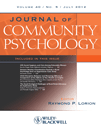
JOURNAL OF COMMUNITY PSYCHOLOGY
Uncovering the Dynamics of Community ResilienceJOURNAL OF COMMUNITY PSYCHOLOGY, published by Wiley, is a leading academic journal that serves as a vital resource for researchers, practitioners, and students in the fields of community psychology, social psychology, and social work. Established in 1973, the journal emphasizes empirical studies, theoretical advancements, and practical applications relevant to community dynamics and the psychosocial factors influencing communities. With an impressive Q1 ranking in Social Work and a Q2 ranking in Social Psychology as of 2023, the journal continues to be a cornerstone for scholarly discourse, engaging hundreds of contributors and readers worldwide. Although it is not an open-access journal, its impactful research regularly contributes to informed community interventions and policies. The journal is indexed under ISSN 0090-4392 and E-ISSN 1520-6629 and is recognized for its high quality through various metrics, including its Scopus rank of #109 in Psychology - Social Psychology. Researchers and professionals alike will find invaluable insights and cutting-edge findings within the pages of this esteemed publication.
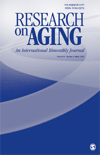
RESEARCH ON AGING
Bridging research and practice in the field of gerontology.RESEARCH ON AGING is a renowned academic journal dedicated to advancing the knowledge and understanding of aging and its multifaceted effects on health, society, and psychology. Published by SAGE PUBLICATIONS INC, this journal has been a pivotal resource since its inception in 1979, disseminating cutting-edge research and insights that shape the field of gerontology. With a commendable impact factor and esteemed rankings in Geriatrics and Gerontology (Q2), Health (social science) (Q1), and Social Psychology (Q2), it positions itself at the forefront of ongoing dialogues in these critical areas. The journal appeals to a diverse audience, including researchers, healthcare professionals, and students, who seek to explore the complexities of aging. Though access is not available through Open Access, RESEARCH ON AGING continues to be an essential platform for impactful research and multidisciplinary discussion, making it an invaluable asset for anyone interested in the social and health-related dimensions of aging through to 2024 and beyond.
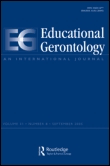
EDUCATIONAL GERONTOLOGY
Advancing knowledge at the intersection of education and aging.EDUCATIONAL GERONTOLOGY, published by Taylor & Francis Inc, is a leading academic journal dedicated to the study of education and aging. With an ISSN of 0360-1277 and an E-ISSN of 1521-0472, this journal has been an essential resource since its inception in 1976, continuing to provide invaluable insights until 2024. As an authoritative platform in the fields of Education and Gerontology, it ranks in the Q2 category for Education and Q3 in Geriatrics and Gerontology, reflecting its significant contribution to these domains. The journal is well-regarded for its rigorous peer-reviewed articles that explore innovative educational practices for older adults and address the challenges faced by this demographic. Researchers, professionals, and students alike can benefit from the multidisciplinary approaches and comprehensive research findings presented within its pages, making it a vital tool for advancing knowledge and practice in educational gerontology.
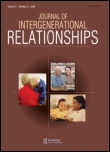
Journal of Intergenerational Relationships
Innovating Perspectives on Aging and RelationshipsThe Journal of Intergenerational Relationships, published by Routledge Journals, Taylor & Francis Ltd, is a premier academic platform dedicated to exploring the dynamic interactions between different generations. With an ISSN of 1535-0770 and E-ISSN of 1535-0932, this journal has established itself as a vital resource in the fields of archaeology, geriatrics, gerontology, sociology, social psychology, and life-course studies. The journal is particularly esteemed for its rigorous research, currently holding a Q1 rank in Archaeology and competitive rankings across various social sciences categories. Its contributions span both theoretical and practical implications, addressing critical issues such as aging, family relationships, and community dynamics. Published continuously since 2003, the journal plays an essential role in academic discourse, offering researchers, professionals, and students insightful analyses and innovative perspectives on intergenerational interactions. While it operates under a subscription-based model, the journal's commitment to advancing knowledge in this vital area ensures it remains a significant touchstone for ongoing research and discussion.